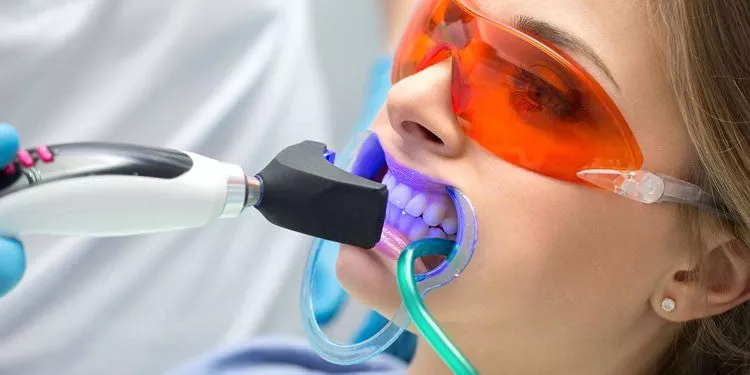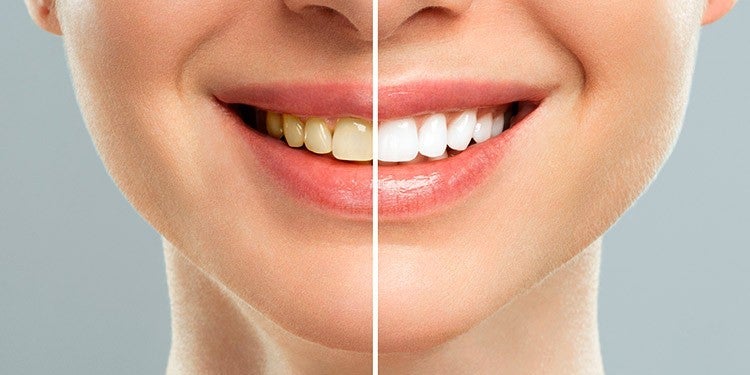Teeth Whitening Options
The cause of tooth discoloration can vary, with stains being extrinsic (more of a surface stain) or intrinsic (stains found below the superficial layer of enamel). Just as there are different causes of discoloration, there are different types of teeth whitening procedures available to treat the problem.
Professional teeth whitening treatments are also available and are highly effective when it comes to both extrinsic and intrinsic stains.
How Does Teeth Whitening Work?
In-Office Procedures
Laser Teeth Whitening
Laser teeth whitening is a cosmetic dental procedure is done in-office by your dental professional and is a detailed, step-by-step process that can yield spectacular results – teeth can be whitened by up to ten shades. At the crux of laser teeth whitening is a concentrated bleaching agent that is applied to the teeth, which is activated by shining a laser (or bleaching light) directly on the surfaces of the teeth. For many people, desired results can be achieved in one sitting. However, multiple sessions may be necessary for some to get the ideal shade of white.
Zoom Whitening
The Zoom Whitening in-office procedure is a fast, effective whitening solution that has great results with little to no sensitivity. The procedure is similar to laser teeth whitening in that your dentist will examine and prep your teeth for the treatment. Once the advanced whitening gel is applied to the teeth, the Philips proprietary WhiteSpeed blue LED light will be used to activate the gel. In just 45 minutes, teeth can be brightened by up to eight shades whiter. This treatment also includes a post-treatment gel to further protect the enamel and ensure sensitivity is at a minimum, as well as at-home whitening trays you can use for touch-up whitening in the future.
At-Home Products
Over the Counter Whitening Treatments
At-Home Professional Kits
If you’re looking for something a little more potent than over-the-counter whitening treatment, your dentist can provide you with a professional-grade at-home whitening treatment. The concentration of the bleaching agent is significantly higher, and these kits often include custom teeth whitening trays to use when applying the treatment to the teeth. Better results are typically obtained with these types of kits when compared to over-the-counter options, mainly due to the concentration of the bleaching agent and the way the custom application helps the whitening solution to fully cover teeth.
Natural Whitening Options
Using chemical agents to whiten teeth is highly effective but can be a source of concern for many. If you prefer to stay away from harsh ingredients that may cause sensitivity or if you feel they may impact your overall health in different ways, there are plenty of natural options for getting beautiful, sparkling white teeth.
Brushing your teeth with a baking soda paste (or a toothpaste with a high concentration of baking soda) can reduce the amount of plaque and significantly whiten your smile. Oil pulling is another option – oil pulling was practiced by the Indians as a traditional folk remedy to improve oral hygiene. While there isn’t much scientific evidence to prove the assertion, many claim it removes toxins from the body and can whiten teeth. Some prefer activated charcoal as a whitening agent, although it’s important to use caution because it can be abrasive for the enamel and gums; there are even natural toothpaste options with activated charcoal, which makes for an easier, more convenient way to try it out.
Differences Between Professional Teeth Whitening and DIY Teeth Whitening
Deciding between teeth whitening at home vs. dentist-applied methods can be a difficult call to make and is a decision based on several factors of what is most important to you.
How Long Does It Take To Whiten Teeth?
How Much Does Teeth Whitening Cost?
If you’re on a budget, cost and whether insurance will cover your whitening treatment will play a big part in the course of treatment you choose.
How Much Does Teeth Whitening Cost with Insurance?
Most dental insurance plans do not cover cosmetic procedures like teeth whitening. Some do claim to offer coverage, however. Hence, it’s important to contact your insurance provider to know exactly what coverage can be applied to the total teeth whitening cost without insurance.
How Much Does Teeth Whitening Cost without Insurance?
The professional teeth whitening cost will vary based on your geographic location, how many sessions are needed to achieve desired results, and which type of treatment you choose. On average, in-office whitening costs anywhere between $450 and $1000, with Zoom whitening falling at the lower end of the scale and laser whitening pushing the upper end.
How Long Does Teeth Whitening Last?
Teeth Whitening Best Practices
Whether you opt for professional in-office whitening or a DIY method, it’s important to be consistent, follow the guidelines for treatment, and take care of your teeth both before and after the process. Take preventive measures when it comes to what you eat and drink to ensure your smile stays bright and beautiful for a long time. Practice good oral hygiene on a regular basis – it makes a huge difference in preventing discoloration in the first place and can eliminate certain conditions in the mouth that promote staining. If you would like a professional consultation regarding the best whitening treatment near me available for your unique situation, use the Smile Generation Find a Dentist tool to find a dental professional near me.
Find your trusted, local dentist today!
Sources
- American Dental Association. (n.d.). Whitening. ADA. https://www.ada.org/resources/ada-library/oral-health-topics/whitening/
- Andrews, J. (2023). How to whiten teeth naturally: 9 home remedies. Healthline. https://www.healthline.com/nutrition/whiten-teeth-naturally
- Warner, J. (n.d.). Teeth whitening: Options for at-home and in-office treatments. WebMD. https://www.webmd.com/oral-health/features/teeth-whitening-at-home-dentist
- Cleveland Clinic. (2023). How to whiten teeth. Cleveland Clinic. https://health.clevelandclinic.org/how-to-whiten-teeth/
- Herrmann, E. (2023, April 22). What are professional take-home teeth whitening kits? Verywell Health. https://www.verywellhealth.com/what-are-professional-take-home-teeth-whitening-kits-1059033
- Colgate. (n.d.). Is laser teeth whitening an option for you? Colgate. https://www.colgate.com/en-us/oral-health/teeth-whitening/is-laser-teeth-whitening-an-option-for-you
- Philips. (n.d.). Zoom in-office teeth whitening. Philips USA. https://www.usa.philips.com/c-m-pe/teeth-whitening/zoom-in-office
- Cleveland Clinic. (2023). Is teeth whitening safe? Cleveland Clinic. https://health.clevelandclinic.org/is-teeth-whitening-safe
- Andrews, J. (2023). Zoom teeth whitening: How it works, cost, and side effects. Healthline. https://www.healthline.com/health/dental-and-oral-health/zoom-teeth-whitening#cost
Smile Generation blog articles are reviewed by a licensed dental professional before publishing. However, we present this information for educational purposes only with the intent to promote readers’ understanding of oral health and oral healthcare treatment options and technology. We do not intend for our blog content to substitute for professional dental care and clinical advice, diagnosis, or treatment planning provided by a licensed dental professional. Smile Generation always recommends seeking the advice of a dentist, physician, or other licensed healthcare professional for a dental or medical condition or treatment.








